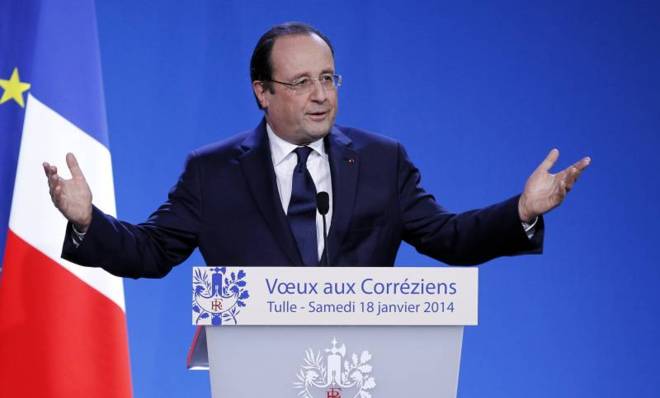The real French presidential security breach


A free daily email with the biggest news stories of the day – and the best features from TheWeek.com
You are now subscribed
Your newsletter sign-up was successful
Pity the historian who attempts to write about the way world leaders are bodyguarded. Every country, it seems, protects its dignitaries differently. How they protect them is as much a function of political culture as it is security.
Case in point: The contretemps over whether French President Francois Hollande's bodyguards failed to adequately protect him before, during, and after his sexual liaison with a French actress. Reportedly, only two security agents from the presidential bodyguard, the GSPR, accompanied him. They failed to check out the apartment's owners, who are (allegedly) connected to the Corsican mob. They failed to notice a photographer snapping pictures of the presidential party as he got off his unmarked scooter to go get off with his mistress.
I'll get to the nitty-gritty of protective methods in a second. But my concern, all along, has been different. France is a nuclear state. The French president is a critical part of his country's nuclear command and control system. Like the American president, he must authenticate a nuclear war order. The French keep secrets better than we do, and so the amount of public information about such matters is limited. The constitution, ratified in 1959, is clear about his essential role, however. No decision can be made without his assent, even though the army exists in the constitution as an independent entity. France is also a charter member of NATO, and I would assume that decisions about whether to use strategic and tactical weapons in Europe would be part of his portfolio.
The Week
Escape your echo chamber. Get the facts behind the news, plus analysis from multiple perspectives.

Sign up for The Week's Free Newsletters
From our morning news briefing to a weekly Good News Newsletter, get the best of The Week delivered directly to your inbox.
From our morning news briefing to a weekly Good News Newsletter, get the best of The Week delivered directly to your inbox.
So: Who carries the French president's "football?" In the U.S., a military aide is always near the president's side. During emergency situations, the Secret Service will (probably) crash the military aide along with the president before anyone else for obvious reasons. In France, even though the tryst apartment was close to the Elysee Palace, there seems to have been no military aide in sight. Mid-coitus, if the French president had to make a nuclear decision, could he do so over an unsecured phone line? When President Obama walks across the street to Blair House, the military aide, supported by a team of Emergency Actions officers, will be near him, within a few dozen feet at most. Unless Hollande's chief bodyguard had a nuclear decision handbook with him and a secure, redundant telephone, the president's irresponsibility is most manifest.
As for protection itself, the secretive nature of the affair did not permit the GSPR bodyguards to arrange for a counter-surveillance team to set up shop near chez rendezvous. Such a team would be sufficient to cover the entire area, particularly if the fact of an imminent presidential visit was not anticipated by anyone. They would have caught the enterprising photographer. The president's preference for secrecy or his distrust of his GSPR team meant that his chief bodyguard could not arrange for even a light presence. I fault the bodyguard for not informing the head of the GSPR, who might have found a way to keep the president's secrets and also enhance his security. I fault the president for insisting on keeping this affair a secret from the whole security team. I mean, I understand why he felt he had to. But this particular situation is not zero-sum. He gets sexual and romantic companionship; France is endangered.
The presidency's GSPR has about 100 agents, working five shifts, supplemented by local police and the French military. They're well trained and exchange information often with the U.S. Secret Service. They generally carry concealed heavy weapons wherever the French president goes. Hollande has bristled at the security, often insisting that his guards scale back their public presence. That rather English attitude is very unique in France. (The British prime minister's motorcade is often fewer than four cars long. Obama's doesn't get smaller than 12.)
Protection of other dignitaries are the responsibility of another agency, the SPHP.
A free daily email with the biggest news stories of the day – and the best features from TheWeek.com
Marc Ambinder is TheWeek.com's editor-at-large. He is the author, with D.B. Grady, of The Command and Deep State: Inside the Government Secrecy Industry. Marc is also a contributing editor for The Atlantic and GQ. Formerly, he served as White House correspondent for National Journal, chief political consultant for CBS News, and politics editor at The Atlantic. Marc is a 2001 graduate of Harvard. He is married to Michael Park, a corporate strategy consultant, and lives in Los Angeles.
-
 How the FCC’s ‘equal time’ rule works
How the FCC’s ‘equal time’ rule worksIn the Spotlight The law is at the heart of the Colbert-CBS conflict
-
 What is the endgame in the DHS shutdown?
What is the endgame in the DHS shutdown?Today’s Big Question Democrats want to rein in ICE’s immigration crackdown
-
 ‘Poor time management isn’t just an inconvenience’
‘Poor time management isn’t just an inconvenience’Instant Opinion Opinion, comment and editorials of the day
